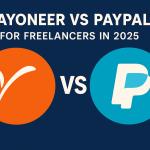The freelance economy continues to expand rapidly in 2025. Companies increasingly rely on remote contractors and gig workers for projects ranging from software development to marketing. But with international freelancers comes a critical question: how do you pay them efficiently, securely, and legally? This guide provides a deep dive into the best methods, platforms, and compliance requirements for paying freelancers in 2025.
Why Paying Freelancers Is Different from Paying Employees
- Freelancers often work across borders, meaning multiple currencies are involved.
- Tax rules differ for independent contractors compared to full-time employees.
- Payment preferences vary widely: some prefer Payoneer or Wise, others want PayPal or direct bank transfers.
- Speed matters: freelancers expect faster payouts, especially for short-term gigs.
Key Factors to Consider When Choosing a Payment Method
- Fees: Transaction, withdrawal, and currency conversion costs.
- Speed: Instant, same-day, or multi-day transfers.
- Global Reach: Can your freelancer access funds in their country?
- Compliance: Does the method meet tax and reporting obligations?
- Convenience: Is it easy for both the payer and freelancer?
Top Platforms for Paying Freelancers in 2025
1. Payoneer
Payoneer remains a leading solution for cross-border freelance payments. It offers low conversion fees (~0.5–2%), direct bank withdrawals in 190+ countries, and strong marketplace integrations (Upwork, Fiverr, Amazon). Businesses can also issue mass payouts to multiple freelancers in one click.
👉 Sign up for Payoneer to streamline global freelancer payments.
2. Wise (formerly TransferWise)
Wise offers transparent exchange rates and supports 50+ currencies. It’s popular with freelancers who prefer to receive funds directly into their local bank accounts. Business accounts can send bulk payments, making it a cost-efficient solution for SMEs.
3. PayPal
PayPal is the most recognized global payment brand, available in 200+ countries. However, it comes with high fees (4–5% for cross-border payments). It’s best used for one-off or small payments where convenience outweighs cost.
4. Deel & Remote.com
These platforms not only handle payments but also offer compliance and contract management. They are ideal for companies hiring freelancers at scale and needing to manage legal risk, tax reporting, and local employment laws.
5. Cryptocurrency Payments
With growing adoption of stablecoins (USDT, USDC), some freelancers accept crypto. This method provides instant transfers and avoids traditional banking restrictions, but compliance and volatility remain issues.
Step-by-Step: Setting Up Freelancer Payments
- Collect Payment Preferences: Ask your freelancer which method they prefer.
- Verify Tax Forms: For US companies, collect W-8BEN or W-9 forms.
- Choose Platform: Select Payoneer, Wise, or another depending on cost and availability.
- Send Payment: Ensure invoice matches contract terms.
- Track & Record: Maintain financial records for audits and compliance.
Legal & Compliance Considerations
- Contractual Agreements: Always have a contract specifying rates, payment method, and deadlines.
- Tax Reporting: Ensure proper reporting of freelance expenses in your country.
- Local Laws: Some countries require freelancers to register as businesses to receive payments.
- Anti-Money Laundering (AML): Platforms like Payoneer and Wise enforce strict KYC compliance to prevent fraud.
Best Practices for Businesses
- Use trusted platforms (Payoneer, Wise, Deel) instead of direct bank wires whenever possible.
- Pay promptly — late payments damage your reputation and freelancer retention.
- Offer multiple payment options to give freelancers flexibility.
- Consolidate payments when working with multiple freelancers to save on transaction costs.
Conclusion
In 2025, paying freelancers is easier than ever, but choosing the right method can save your business thousands in fees while ensuring compliance. For most companies, the best approach is to combine Payoneer or Wise for cost efficiency with Deel or Remote.com for compliance at scale.
Disclosure: This article contains affiliate links. We may earn a commission if you sign up via our Payoneer link, at no extra cost to you.





